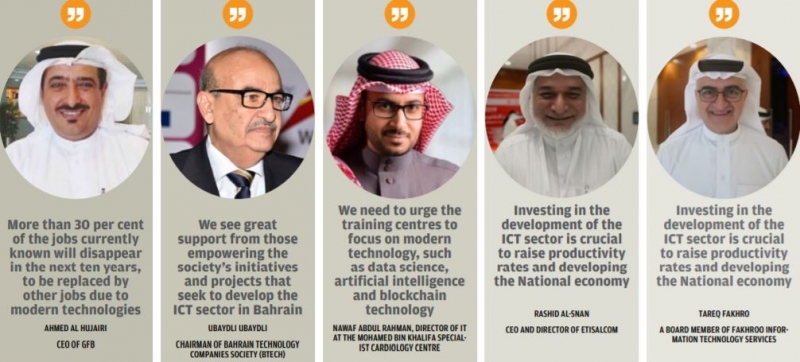Tamkeen leading digital transformation
Experts and stakeholders in the ICT sector stressed the importance of Tamkeen’s role in supporting the sector as it accelerates business, provides quality jobs for Bahrainis and supports the process of digital transformation in the Kingdom of Bahrain.
They pointed out that Tamkeen’s support for the ICT sector was reflected in many aspects, from the establishment of ICT support service for more than three thousand Bahraini institutions, as well as introducing of ICT professional certificates for 7800 Bahrainis, in addition to the continuous work of Tamkeen to build an effective partnership with global technology companies such as Amazon and Microsoft to establishing technology incubators and accelerators.
Strategic partnership
The Chairman of Bahrain Technology Companies Society (BTECH) Ubaydli Ubaydli explained that BTECH is working to keep up with the rapid developments of the ICT sector and how they can implement such advancements in Bahrain.
Ubaydli stressed that BTECH plays a key role in bridging the gap between technology companies in the private sector and government and semi-government entities in Bahrain.He added, “We see great support from those empowering the society’s initiatives and projects that seek to develop the ICT sector in Bahrain, and help its companies grow, enabling them to strike fruitful partnerships with their counterparts in Bahrain, the region and the world, and to export their services and products to various markets.”
He pointed out that the Bahrain Economic Development Board positioned the ICT sector as one of the five main sectors targeting support and growth, and that the aspects of a national plan for the transition towards the digital economy are being planned out, considering that all of this confirms the importance of moving forward in supporting and developing this sector.
Keeping up with job market
Ahmed Al Hujairi, CEO of GFB, mentioned that the World Economic Forum indicated that more than 30 per cent of the jobs currently known will disappear in the next ten years, to be replaced by other jobs due to modern technologies. He also said that the need for a driver’s job will gradually decrease because cars will drive themselves, depending on the Internet of Things and smart applications, and the smart interactive whiteboard will replace the school teacher, and robots will take over firefighters.
Al-Hujairi emphasized that training and qualifying more Bahrainis to learn how to use modern technologies would ensure the localization of those applications in the Kingdom of Bahrain. This would depend on the expertise of these Bahraini individuals, creating a national vision and leading the digital transformation of the Kingdom.
He also pointed out the importance of Tamkeen’s support for the professional certification in ICT and called for expanding this support so that professional training is not limited to those studying or graduating from colleges of information technology, but to everyone, especially as ICT has become an essential element in various business institutions.
“Today we are talking about food technology, and even the taxi driver has to deal with applications such as Uber. Entrepreneurs are turning not towards investing in technology, but also developing it by building applications and information systems that help them accelerate their businesses in the industrial, commercial, or service field.Therefore, we believe that the more we can qualify Bahrainis in the ICT sector, the more we can achieve national goals in supporting the private sector and building the digital economy,” said Al Hujairi.
Responsibility of training centres
Nawaf Abdul Rahman, director of IT at the Mohamed bin Khalifa Specialist Cardiology Centre, explained that Tamkeen has come a long way in empowering the various sectors, particularly the emerging institutions, with a special interest in ICT companies.
Nawaf pointed out the importance of training centres to develop their professional certificates with Tamkeen’s support, including new science from the ICT, offering progressive programs and opening the field to anyone interested in any specific science or specialization.
“We need to urge the training centres to focus on modern technology, such as data science, artificial intelligence and blockchain technology, which is the backbone of the digital economy,” Nawaf added.
Technology in various sectors
CEO and Director of Etisalcom, Rashid Al-Snan said: “The ICT sector has become the main bearer of development. Today we see more integration of technologies in the banking sector such as financial technology (Fintech), in the logistical sector we see it via Blockchain technology, and in the tourism sector through customer service applications. Thus, investing in the development of the ICT sector is crucial to raise productivity rates and developing the National economy.”
Al-Snan called for directing a greater part of Tamkeen’s budget to support the ICT sector in Bahrain, including Bahraini companies and individuals, ICT systems, technology applications, etc.
He added: “In the past, Tamkeen has played a major role in supporting this sector, and we stress today the importance of strengthening this role, especially in this era of digital transformation.”
Maximizing Bahrainisation
Tareq Fakhro, a board member of Fakhroo Information Technology Services, pointed out that Tamkeen was able to make a clear positive change in the national economy, by continuously developing its programmes and services through successful strategic plans every three years, and by providing suitable services that are appropriate to the company’s requirements and size.
Fakhro said that Tamkeen’s support for the ICT sector evolves with the development of the needs of this sector. Moreover, Fakhro highlighted the importance of maximizing the percentage of Bahrainisation in this highly competitive sector.
“Wherever we can build Bahraini companies that offer competitive services, products, software and information systems, we can reduce the deficit in what we might call the digital trade balance, export digital products, and raise the contribution of the technical sector to the GDP of the Kingdom of Bahrain,” said Fakhro.
Related Posts

